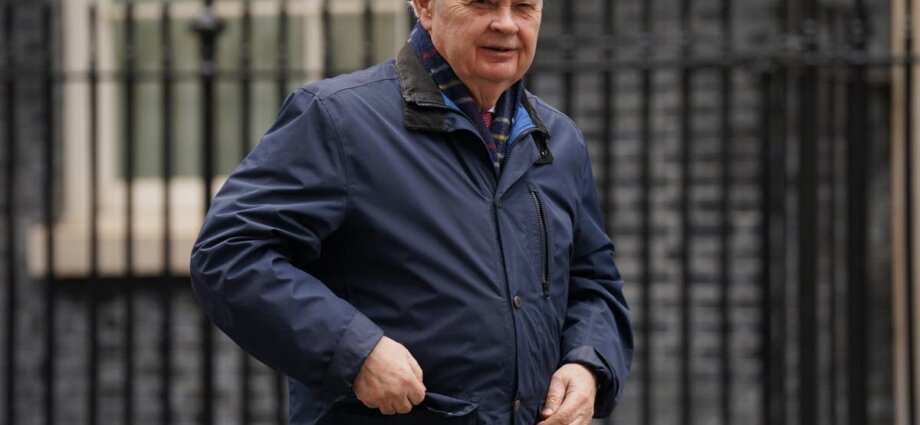A plan by Brics countries to create a separate banking payments system could render international sanctions useless, a former chancellor of the Exchequer has warned.
Brics, an alliance of major developing countries, includes Russia, China, India and Brazil as founding members, and now also South Africa, Iran, Egypt, the United Arab Emirates (UAE) and Ethiopia.
Lord Lamont of Lerwick warned that a rival payments system would be a “major threat to the Western-led financial system” if it ever came to pass.
His comments came after Russian President Vladimir Putin announced his plan to de-dollarise the world economy at the latest Brics summit last month.
Lord Lamont told the House of Lords on Thursday: “While the idea of a Brics payments system, which was announced by Mr Putin at the Kazan Brics conference, may seem rather fanciful and a long way off, nevertheless it needs to be taken seriously.
“If it ever happened, it would be a major threat to the Western-led financial system, but above all it would make it impossible for the West to impose sanctions on countries like Russia, China or Iran or other malign countries.”
Financial Secretary to the Treasury Lord Livermore said: “The Government believes an integrated global financial system is the best way to achieve global prosperity and financial stability.
“Fragmentation is damaging to the global economy, whereas deep liquid markets boost economic efficiency.
“That is why we will continue to work with our international partners to strengthen the rules-based international system and our interconnected financial and economic systems.”
He added: “I won’t comment on the specific proposals announced by the Brics countries. I wouldn’t want to speculate as to what systems may or may not come into common usage.
“What I will say is the Government believes very much that the current international model of the financial system works effectively and that we will continue to work with our international partners to maintain an interconnected financial and economic system.
“On the question of sanctions effectiveness, of course we continue to believe that economic sanctions are an important and effective tool and will continue to utilise those sanctions where necessary.
“In terms of the potential to undermine them, we will pursue any necessary steps with our allies to maintain the interconnected system and to reduce opportunities for the circumvention or evasion of international sanctions.”
Lord Lamont raised concerns about reports that the Brics payment system would be based on technology from the Bank for International Settlements (BIS), which has been developing a cross-border payments platform called Project mBridge.
However, BIS has denied any link between Brics and mBridge.
BIS general manager Agustin Carstens said: “mBridge is not the ‘Brics bridge’ – I have to say categorically. mBridge was not created to cater to the needs of the BRICS. It was put together to satisfy broad central bank necessities.
“We at the BIS – I think this an opportunity to set the record straight – we always try to be a good global citizen. And the BIS does not operate with any countries, nor can its products be used by any countries that are subject to sanctions. This will continue to be the case.
“And all central bank members are in this mindset that we need to be observant of sanctions and whatever products we put together should not be a conduit to violate sanctions.”
Former top diplomat Lord Hannay of Chiswick warned that President-elect Donald Trump’s proposal to significantly raise tariffs on imported goods to the US could accelerate the Brics countries’ plan.
The independent crossbench peer said: “If the President-elect of the US goes ahead with some of the more extreme versions of his tariffs ideas, this is likely to add momentum and an impetus to the attempts by the Brics to break away from the financial system that currently exists.”
Meanwhile, Liberal Democrat peer Baroness Kramer warned that the current international payments system is “hapless” and that, if the Brics countries manage to create one that works better, users will flock to this alternative.
She said: “Because of my complex family, I need to transfer funds across international borders several times a year.
“The system assumes I’m a terrorist, the banks have rip-off charges and exchange rates and obstructive technology, and even the new online apps for which I had high hopes have very severe limitations.
“Do Western governments, including ours, understand that, if they fail to remedy this absolutely hapless international payments system and the Brics devise any international payments system that’s even halfway efficient and reasonably priced, users will simply flock to the Brics system out of sheer frustration?”
Lord Livermore said he did not not think it would be “appropriate” to comment on the Trump administration’s future policies, but said the UK will “work closely with the US on a range of security issues, including sanctions”.
On the problems with the current international payments system, he told Lady Kramer: “I share some of her frustrations in this regard; I’m always happy to vouch for her that she’s not a terrorist, I’m very certain of that fact.
“There is obviously an extremely serious point that she’s making and fragmentation along the lines that she describes would be very damaging to the global economy. We must ensure that doesn’t proceed.”











